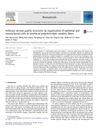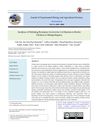November 2023 in “IntechOpen eBooks” Arsenic exposure from contaminated water severely damages the skin, causing hair loss, pigmentation changes, irritation, and can lead to skin cancer.
 1 citations,
December 2022 in “BMC Plant Biology”
1 citations,
December 2022 in “BMC Plant Biology” The black orchid Brasiliorchis schunkeana produces chemicals that attract certain insects and have potential antimicrobial properties.
 June 2024 in “Computational and Structural Biotechnology Journal”
June 2024 in “Computational and Structural Biotechnology Journal” Multi-omics techniques help understand the molecular causes of androgenetic alopecia.
 131 citations,
September 2017 in “Molecular and Cellular Endocrinology”
131 citations,
September 2017 in “Molecular and Cellular Endocrinology” The document concludes that blocking the internal pathways that create androgens might help treat cancers that depend on sex hormones.
67 citations,
December 2013 in “Journal of Biological Chemistry” SCD1 is crucial for skin health and overall energy balance.
2 citations,
July 2009 in “Mayo Clinic Proceedings” A 66-year-old woman with skin lesions and other symptoms improved after treatment for porphyria cutanea tarda.
 August 2023 in “MOJ women's health”
August 2023 in “MOJ women's health” Brown Adipose Tissue (BAT) could potentially treat Polycystic Ovary Syndrome (PCOS) by controlling energy balance and lipid homeostasis, but more human research is needed.
June 2009 in “Mayo Clinic Proceedings” A woman was diagnosed with porphyria cutanea tarda and improved with phlebotomy and lifestyle changes.
 128 citations,
October 2011 in “Development”
128 citations,
October 2011 in “Development” Activating a protein called β-catenin in adult skin can make it behave like young skin, potentially helping with skin aging and hair loss.
35 citations,
January 2011 in “Journal of Biological Chemistry” sPLA2-X is crucial for normal hair growth and follicle health.
 28 citations,
April 2023 in “Stem cell research & therapy”
28 citations,
April 2023 in “Stem cell research & therapy” Tiny vesicles from stem cells could be a new treatment for healing wounds.
21 citations,
March 2018 in “American Journal Of Pathology” Mutations in NIPAL4 cause skin issues by disrupting lipid layers, but some improvement is seen with topical treatment.
13 citations,
May 2021 in “FASEB bioAdvances” Plant-based products can improve hair and skin health without harmful side effects.
 7 citations,
June 2022 in “Frontiers in Medicine”
7 citations,
June 2022 in “Frontiers in Medicine” ADSC-derived extracellular vesicles show promise for skin and hair regeneration and wound healing.
 2 citations,
January 2023 in “BioMed Research International”
2 citations,
January 2023 in “BioMed Research International” The secretome from mesenchymal stromal cells shows promise for improving facial nerve injury treatment.
 1 citations,
June 2023 in “Journal of Cosmetic Dermatology”
1 citations,
June 2023 in “Journal of Cosmetic Dermatology” Exosome treatment for hair growth is promising but not FDA-approved and needs more research on safety and how it works.
 August 2024 in “Indian Journal of Skin Allergy”
August 2024 in “Indian Journal of Skin Allergy” Stem-cell therapy shows promise for skin conditions but needs more research.
 February 2024 in “World journal of stem cells”
February 2024 in “World journal of stem cells” Adipose-derived stem cells can help repair and improve eye tissues and appearance.
November 2016 in “Regenerative Medicine” In September 2016, there were major advancements and promising clinical trials in stem cell research and regenerative medicine.

Metformin helps manage weight, blood pressure, and hormonal imbalances in PCOS patients.
 40 citations,
June 2013 in “Biomaterials”
40 citations,
June 2013 in “Biomaterials” Scientists created 3D hair-like structures that could help study hair growth and test treatments.
 20 citations,
April 2012 in “Fertility and Sterility”
20 citations,
April 2012 in “Fertility and Sterility” Finasteride causes lasting fertility decrease in rats.
 October 2023 in “Benha Journal of Applied Sciences”
October 2023 in “Benha Journal of Applied Sciences” Insulin resistance may contribute to hair loss in people with androgenic alopecia.
 June 2022 in “Journal of Experimental Biology and Agricultural Sciences”
June 2022 in “Journal of Experimental Biology and Agricultural Sciences” Most E. coli in broiler chickens are resistant to multiple antibiotics.
 May 2021 in “Austin journal of pharmacology and therapeutics”
May 2021 in “Austin journal of pharmacology and therapeutics” Physalis fruits have medicinal properties that can help treat various diseases and have anti-inflammatory, antioxidant, antibacterial, and antitumor effects.
 191 citations,
May 2018 in “British journal of dermatology/British journal of dermatology, Supplement”
191 citations,
May 2018 in “British journal of dermatology/British journal of dermatology, Supplement” Alopecia areata is likely an autoimmune disease with unclear triggers, involving various immune cells and molecules, and currently has no cure.
 45 citations,
February 2019 in “Journal of Affective Disorders”
45 citations,
February 2019 in “Journal of Affective Disorders” Melatonin improved mental health and metabolism in women with PCOS.
 41 citations,
January 2020 in “Journal of Ovarian Research”
41 citations,
January 2020 in “Journal of Ovarian Research” Quercetin may help with PCOS symptoms, but more research is needed.
 32 citations,
February 2017 in “Oncotarget”
32 citations,
February 2017 in “Oncotarget” Cellular senescence has both cancer-blocking and cancer-promoting effects, and targeting senescent cells may improve health and lifespan.
 32 citations,
April 2013 in “Anais Brasileiros de Dermatologia”
32 citations,
April 2013 in “Anais Brasileiros de Dermatologia” The document concludes that inherited epidermolysis bullosa is a challenging genetic condition requiring multidisciplinary care and new treatments.





















